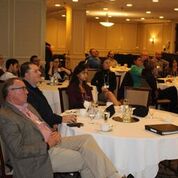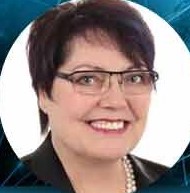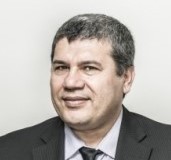London Section Annual General Meeting (AGM) 2018

Come join us for our 2018 Annual General Meeting.
Meet our 2018 award winners, the candidates for our executive, our guest speaker Dr. Ebrahim Ghafar-Zadeh, the current President of IEEE Canada, and your fellow London Section members. See the detailed agenda below.
Date and Time
Location
Hosts
Registration
-
 Add Event to Calendar
Add Event to Calendar
- Starts 05 November 2018 09:00 PM UTC
- Ends 23 November 2018 03:00 AM UTC
- Admission fee ?
Speakers
 Dr. Maike Luiken
Dr. Maike Luiken
Welcome from IEEE Canada (Region 7)
Biography:
Maike Luiken is the IEEE Canada President-Elect 2016-2017 and will serve as the IEEE Canada President 2018-2019. She was the past founding director of the Bluewater Technology Access Centre (BTAC) (2013) following eight years as Dean at Lambton College, first as Dean, School of Technology, Applied Sciences and Apprenticeship, Fire School, Applied Research (2005), then as Dean of Applied Research and Innovation, Business Development and Sustainable Development (2007). Prior to her engagement at Lambton College, she was Vice-President Research Alliances at the National Capital Institute of Telecommunications (NCIT) in Ottawa. Maike obtained her Staatsexamen in Mathematics and Physics from the Technical University Carolo-Wilhelmina in Braunschweig, Germany (1979) and her Ph.D. in Physics from the University of Waterloo (1982). She spent a year at the University of Manitoba studying for a Master’s in Electrical Engineering. Maike is currently serving/has been serving on numerous Boards of Directors and Committees, including Nano Ontario, Canadian Hydrogen and Fuel Cell Association (CHFCA), IEEE Canada, IEEE Canadian Foundation, Sarnia/Lambton Workforce Development Board; Bluewater Sustainability Initiative, Rotary Club of Sarnia; Southwestern Ontario Bio-Products Innovation Network (SOBIN), Sarnia/Lambton Chamber of Commerce, Unmanned Systems Canada, Ontario Centres of Excellence (OCE) Advanced Manufacturing Sector Advisory Board. She contributes frequently to the IEEE Canadian Review as Associate Editor and Editorial Focus Advisor, Technology. In addition to her academic career and volunteer activities Maike owns a technology consulting practice and has been engaged in the private sector for 15 years. Maike is a Fellow of the Engineering Institute of Canada and a Senior Member of IEEE.
 Dr. Ebrahim Ghafar-Zadeh of Department of EECS, Lassonde School of Engineering, York University
Dr. Ebrahim Ghafar-Zadeh of Department of EECS, Lassonde School of Engineering, York University
Emerging CMOS Technologies for Life Science Applications
Recent advances in micro- and nano- Complementary Metal Oxide Semiconductor (CMOS) technologies have enabled the development of High-Throughput Screening (HTS) techniques for various applications including drug discovery. Owing to the seminal advances in micro-fabrication technologies, HTS is moving towards massively parallel, miniaturized, and label free platforms. A state-of-the-art DNA sequencing platform featuring millions of Ion-Selective Field Effect Transistors (ISFETs) has convincingly demonstrated the advantage of using standard microelectronic technologies such as Complementary Metal Oxide Semiconductor (CMOS) process in HTS applications. Similarly, many researchers have addressed the challenge of developing HTS systems for monitoring cellular activities on a single chip. Due to the significant advantages of CMOS-based biosensors, such as non-invasive long-term recordings, fast response and label free process, they have been widely applied in many biological and medical fields concerning the study of living-cell samples such as neural cell recording and stimulation, monitoring metabolic activity, cell manipulation, and extracellular pH monitoring. Among various CMOS sensing techniques, the speaker has focused on impedance and capacitive sensors as low-complexity, high precision, label free sensing methods for monitoring the cellular activities such as cell viability, proliferation and morphology. These electrochemical sensors operate based on the measurement of cell-CMOS interaction properties. In this direction, his team previously proposed various capacitive sensors for bacteria growth monitoring, chemical solvent monitoring, Cancer cell proliferation tracking and drug tests. The speaker will share with the audience some of his team research achievements, the current challenges and future works.
Biography:
Ebrahim Ghafar-Zadeh (PhD, P.ENG) received his BSc., MSc. and PhD in Electrical Engineering from KNT University, Tehran, Iran, University of Tehran, Iran and Ecole Polyetechnique of Montreal, Canada in 1992, 1997 and 2008. As per recognition of his research achievement on CMOS Sensors for Lab on Chip applications, he received four Post Doctoral Fellowship Awards from PDF NSERC, IRDF NSERC ReSMiQ, FQRNT that allowed him to join the department of ECE and department of Bio-engineering in McGill University, Montreal, Canada and University of California, Berkeley, US in 2008 and 2010 respectively . In 2013, Dr. Ghafar-Zadeh joined the department of EECS, Lassonde School of Engineering, York University where currently he is an assistant professor and director of Biologically Inspired Sensors and Actuators Laboratory. The research focus of Ebrahim combines CMOS Circuit Design, Microfluidics and Classical Knowledge of Biology and Chemistry to develop innovative devices for life science applications. Dr. Ghafar-Zadeh has published more than 110 papers in various prestigious journals and conferences on various multidisciplinary research topics.
Agenda
5:30 Life Member Meeting
6:00 Networking with Cash Bar
7:00 Welcome, Reports, Elections
7:30 Buffet Dinner: Buffet, Please note any allergies or food limitations in your registration so we can address these.
8:10 Welcome from IEEE Canada (Region 7) - Dr. Maike Luiken
8:30 Keynote Speaker - Dr. Ebrahim Ghafar-Zadeh - Emerging CMOS Technologies for Life Science Applications
9:10 2018 Awards
10:00 Adjournment

